Books: english
Books: english
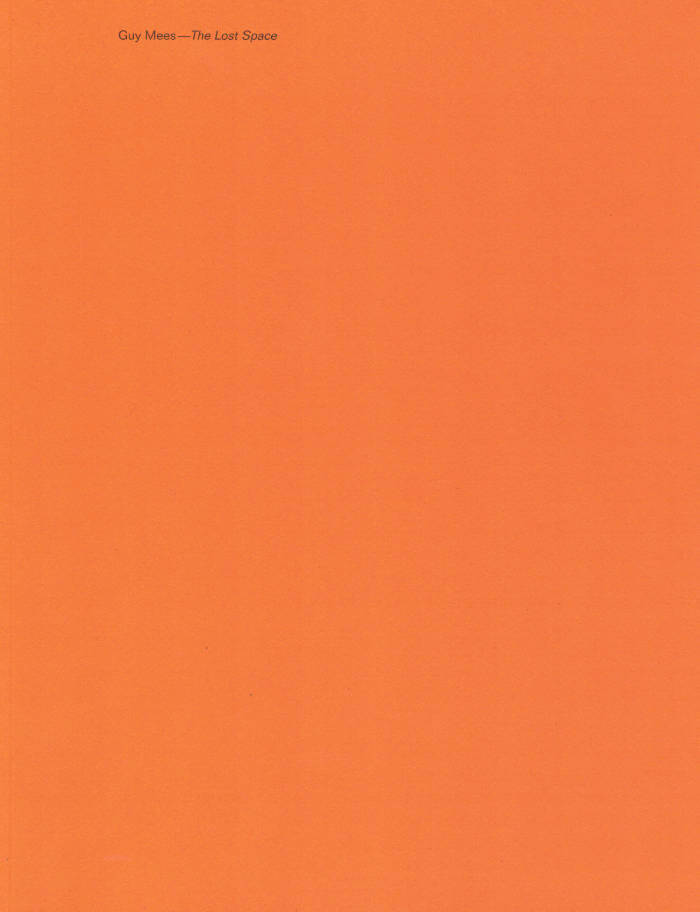
The Lost Space
Publication devoted to the only statement the Belgian artist has ever published about his own work.
Those familiar with Guy Mees know that he used the enigmatic title Lost Space to describe two major bodies of work, distinct in origin and form, and separated by a gap of more than twenty years: the geometric objects and panels covered in lace created in the 1960s, and the works he started producing in the 1980s featuring colour paper cutouts pinned to walls. This publication is dedicated to a lesser-known chapter in this story: the writing process of a short text entitled, likewise,The Lost Space. An ambiguous manifesto for Mees' work, the text went through a number of revisions, with Mees contributing suggestions, but never authoring it himself. This book reproduces eight extant versions of the text for the first time, in facsimile and typographic transcription as Richard Hamilton did with the Large Glass notes of Marcel Duchamp.
Published on the occasion of Guy Mees at MU.ZEE, Ostende, in 2019.
Limited edition of 350 copies.
Guy Mees (1935-2003) is a Belgian artist whose oeuvre encompasses photographs, videos, sculptures, and fragile works on paper that combine formal rigor with delicacy and a conceptual approach. A leading figure of the Belgian avant-garde, Mees left behind an outstanding body of work that transgresses geometric abstraction, Minimalism, Conceptualism, and applied arts.
Edited by Lilou Vidal.
Graphic design: Joris Kritis.
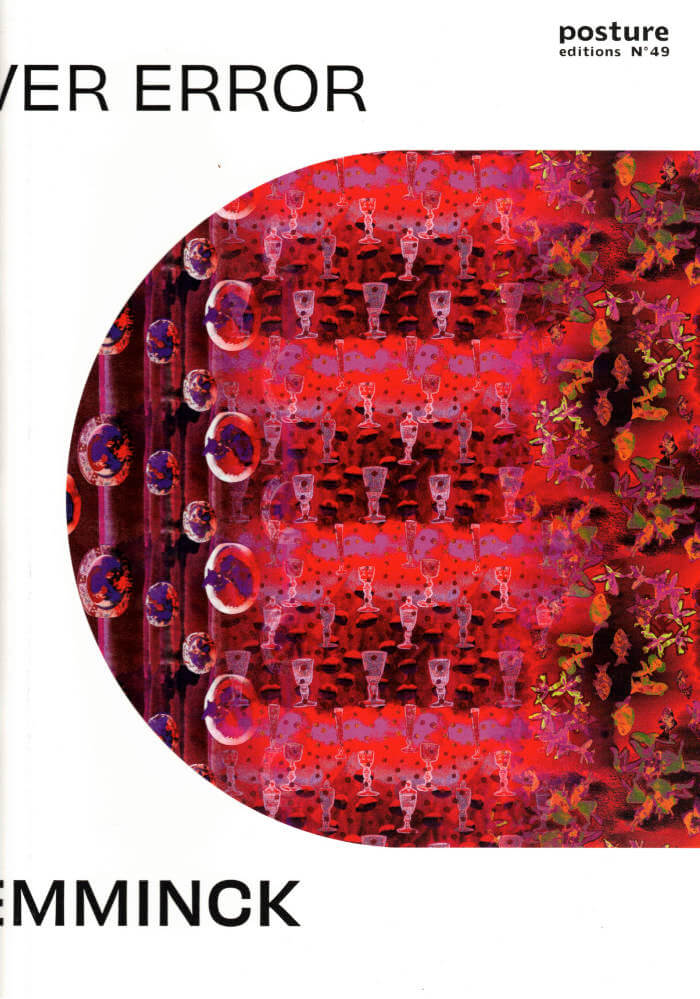
Screensaver Error
Nº 49 / October 2022
In her work, Lisa Vlaemminck explores the boundaries of painting, creating an exciting, vibrating and disorienting universe. In her images, she questions very classical phenomena in painting, such as the landscape and the still life, by freezing them behind semi-transparent layers of paint. We catch a glimpse that feels familiar, but soon find that nothing is what it seems. Vlaemminck’s work oscillates between the microscopic and the interstellar, as well as the amorphous spaces in between. Image, material, shape, texture and form mutate into compositional playgrounds floating in a newly created universe where different laws and rules apply.
The book “Screensaver Error” is conceived as a symmetrical, folded stack of sheets with images of Lisa’s paintings and collages.
At the heart of the book is the sixty-metre long, worm-shaped textile sculpture, which runs like a stream through the book for many pages.
Dominique De Groen wrote an electrically charged shimmering poem tailored to the work. The introductory text was written by Simon Delobel.
In KIOSK, Lisa Vlaemminck presents a series of new paintings and a sixty-metre long textile sculpture that will occupy the various exhibition spaces. For the design of the fabric, Lisa worked patterns that form a long colour gradient.
At the end of the exhibition, the sculpture, Meat A Morph Hose, will be cut into 35 separate, new sculptures that will be offered as artworks at € 350 each. Each work is a part of the colour gradient and has a unique print. The proceeds will finance the book. Details: Printed cotton, latex spaghetti filling, the ends are closed with climbing rope
40 cm diameter x 130cmA signed copy of the book will also be delivered together with the work.
The sculptures can be collected from KIOSK at the book-launch: Sat. 26 November
The artist is reprented by gallery rodolphe janssen

sawing a plank is like going for a walk
With texts by Phillip Van den Bossche, Filarowska and a conversation between Eva Wittocx and the artist (NL/EN)
Nº 48 / October 2022
sawing a plank is like going for a walk by Kato Six (b. 1986) is published on the occasion of Kato’s solo exhibition at M Leuven this autumn. This book encapsulates 10 years of her quest as an artist.
The work of Kato Six (b. 1986) balances between abstract and figurative art. She works on different themes which she develops into series or ensembles. Architecture, design, domesticity and utensils all act as important references. Starting there, she uses recognisable and everyday materials such as MDF, stone, plastic or textiles.
Kato wants to question certain affinities and let the viewer look at familiar objects or images from a different perspective. As a viewer, you feel connected to the object or image but the actual meaning or function no longer applies.
Some of my works refer to the domestic, especially the most recent ones, such as ‘Carpet Beater Carpet’ and ‘Striped Knitwear’. The invisible work done by “housewives”, but also by workers or maintenance staff, is certainly one of the themes addressed in ‘Carpet Beater Carpet’. The above works are textile works, created with so-called “soft skills”. In the arts, these “soft skills” are often attributed to female artists — women often being assigned a certain medium.
Kato Six in conversation with Eva Wittocx in “sawing a plank is like going for a walk”

Pathetic Literature
A unique collection composed by the award-winning poet and writer, a global anthology of pieces from lesser-known classics by luminaries like Franz Kafka, Samuel R. Delany, and Gwendolyn Brooks to up-and-coming writers that examine pathos and feeling, giving a well-timed rehab to the word "pathetic"
"Literature is pathetic." So claims Eileen Myles in their bold and bracing introduction to Pathetic Literature, an exuberant collection of pieces ranging from poetry to theater to prose to something in between, all of which explore those so-called "pathetic" or sensitive feelings around which lives are built and revolutions are incited.
Myles first reclaimed the word for a seminar they taught at the University of California San Diego, rescuing it from the derision into which it had slipped and restoring its original meaning of inspiring emotion or feeling, from the Ancient Greek rhetorical method pathos. Their reinvention of "pathetic" formed the bedrock for this anthology, which includes a breathtaking 106 contributors, encompassing titans of global literature like Robert Walser, Jorge Luis Borges, Rumi, and Gwendolyn Brooks, queer icons and revolutionaries like Dodie Bellamy, Samuel R. Delany, and Bob Flanagan, as well as the invigorating newness and excitement of writers on the rise, including Nicole Wallace, Precious Okoyomon, and Will Farris. Creative nonfiction by Karla Cornejo Villavicencio, Jack Halberstam, and Porochista Khakpour rubs shoulders with poetry by Natalie Diaz, Victoria Chang, Lucille Clifton, and Ariana Reines, all joined by prose from Chester Himes, Djuna Barnes, Chris Kraus, and Qiu Miaojin, among so many others. The result is a matchless anthology that is as much an ongoing dialogue as an essential compendium of queer, revolutionary, joyful, and always moving literature.
From confrontations with suffering, embarrassment, and disquiet, to the comforts and consolations of finding one's familiar double in a poem, Pathetic Literature is a swarming taxonomy of ways to think differently and live pathetically on a polarized and fearful planet.

My Manservant and Me
My Manservant and Me is a story about the trials and tribulations of having a live-in valet. Written from the uneasy perspective of an aging, incontinent author of extremely successful middlebrow plays, we learn about his manservant, a young film actor who is easily moved to both delicate gestures and terrible tantrums; who's been authorized to handle his master's finances, who orders stock buys, dictates his master's wardrobe, sleeps in his master's bed, and yet won't let him watch variety television. My Manservant and Me reveals the rude specificities of this relationship with provocative humor and stylistic abjection. This manservant won't be going anywhere.
Hervé Guibert (1955-1991) was a French writer and photographer. A critic for Le Monde, he was the author of some thirty books, most notably To the Friend Who Did Not Save My Life, which presents an intimate portrait of Michel Foucault and played a significant role in changing public attitudes in France towards AIDS.
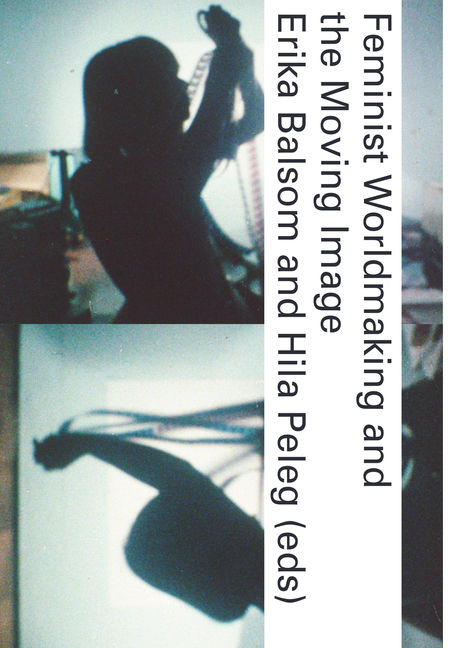
Feminist Worldmaking and the Moving Image
This book offers intersectional, intergenerational, and international perspectives on nonfiction film- and videomaking by and about women, examining practices that range from activist documentaries to avant-garde experiments. Concentrating primarily on the period between the 1970s and 1990s, the contributions revisit major figures, contexts, and debates across a polycentric, global geography. They explore how the moving image has been a crucial terrain of feminist struggle—a way of not only picturing the world but remaking it.
The contributors consider key decolonial filmmakers, including Trinh T. Minh-ha and Sarah Maldoror; explore collectively produced films with ties to women's liberation movements in different countries; and investigate the cinematic expressions of tensions and alliances between feminism and anti-imperialist struggles. They grapple with the need for a broader more inclusive definition of the term "feminism"; meditate on the figure of the grandmother; reflect on realist aesthetics; and ask what a feminist film historiography might look like.
The book, generously illustrated with film stills and other images, many in color, offers ten original texts, two conversations, and eight short essays composed in response to historical texts written by filmmakers. The historical texts, half of which are published in English for the first time, appear alongside the essays.
Contributors
Helena Amiradżibi, Madeleine Bernstorff, Teresa Castro, Counter Encounters (Laura Huertas Millán, Onyeka Igwe, Rachael Rakes), Ayanna Dozier, Forough Farrokhzad, Safi Faye, Devika Girish, Elena Gorfinkel, Haneda Sumiko, Shai Heredia, Juliet Jacques, Sarah Keller, Nzingha Kendall, Julia Lesage, Beatrice Loayza, Janaína Oliveira, Lakshmi Padmanabhan, Yasmina Price, Elizabeth Ramírez-Soto, Pooja Rangan, Lis Rhodes, Sara Saljoughi, Rasha Salti, Isabel Seguí, Chick Strand, Monika Talarczyk, Trinh T. Minh-ha, Françoise Vergès, Claudia von Alemann, Mitsuyo Wada-Marciano, Shilyh Warren, Giovanna Zapperi
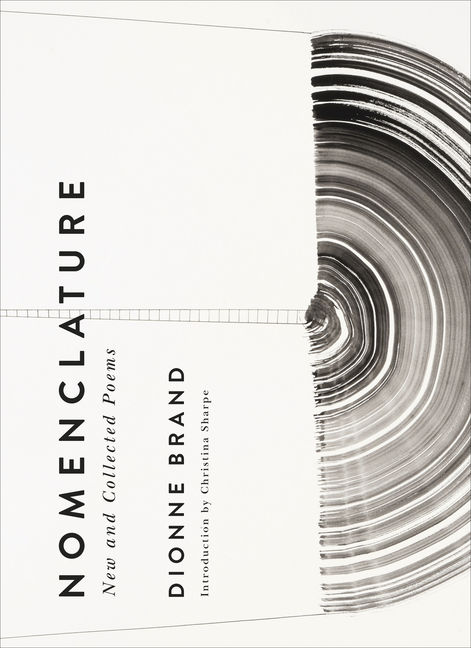
Nomenclature: New and Collected Poems
Nomenclature: New and Collected Poems collects eight volumes of Dionne Brand's poetry published between 1983 and 2010, as well as a new long poem, the titular Nomenclature for the time being.
Dionne Brand is the author of numerous volumes of fiction, poetry, and nonfiction. Her latest poetry collection, The Blue Clerk, also published by Duke University Press, was shortlisted for the Griffin Poetry Prize and won the Trillium Book Award. Her other poetry collections have won the Griffin Poetry Prize, the Governor General's Literary Award, the Trillium Book Award, and the Pat Lowther Memorial Award. Brand's novel, Theory, won the 2019 OCM Bocas Prize for Fiction and the Toronto Book Award, and What We All Long For won the Toronto Book Award. Her works of nonfiction include Bread Out of Stone and A Map to the Door of No Return: Notes to Belonging. From 2009 to 2012 Brand served as Toronto's Poet Laureate. In 2021 Brand was awarded a Windham-Campbell Prize in Fiction. She lives in Toronto.

Amanda
The artist book Amanda is greatly inspired by “Tradeswomen” quarterly magazine for women in blue-collar work, published in the 1980’s and 1990’s in the United States. Amanda is similarly thought as a periodical dealing with the subjects of technology and industry from a feminist (not solely female) angle. The first issue contains fiction stories of an emancipatory character, citing trade associations, oil industry in Iran and ghosts of the printer feeders.
The publication is made in the framework of The Building Institute, an experimental organisation aiming to strengthen the position of femmes builders in the domain of technical construction work. Amanda brings together literary texts by Maria Toumazou, Samantha McCulloch, Sepideh Karami and Madeleine Morley, combining fiction stories with visual artwork.
Olga Micińska is a visual artist currently living in Amsterdam. Graduated from the MA Art Praxis program at the Dutch Art Institute and holds an MFA in Sculpture from the Academy of Fine Arts in Warsaw. Also trained as a woodworker, collaborates with craft studios of various domains. Recently she has initiated The Building Institute.
The Building Institute (TBI) is an experimental platform aiming to emancipate the undermined knowledges dwelling in the craft domains, and to unpack diverse questions related to technology and the means of production. TBI combines art’s speculative competences with the grounded practice of manual labor, manifesting its objectives through educational activities, exhibitions, and publications.

Language is a map of failures: Messy thoughts on reading, writing and dressing up
Afternoon Editions no. 3: Language is a map of failures. Messy thoughts on reading, writing and dressing up by Runa Borch Skolseg.
In May 2019, Time has fallen asleep in the afternoon sunshine relocated its base to the Oslo Biennale headquarters in Myntgata, with a room of its own and ongoing activities. Runa Borch Skolseg visited the space at several occasions before its final closure, in 2021. Her invitation to write for the Afternoon Editions bridges the move from one room to another, and is a reflection on how fashion can be a world of fantasy, and drama, a language we all communicate through. With a personal narrative she makes readings of clothes, literature and writing, and how they merge and enrich each other.

Writing Dance
‘Human beings embody whatever they meet, and it’s all there when you work whether you want it there or not.’ Practice is like the dust that accumulates, and revisiting fragments of essays and talks on choreography Jonathan Burrows ended up embracing the haphazard and the mess, moments of unfocus and focus, harnessing them in pithy formulations and scores, adding room and punctuation and line breaks in the process so readers can hear the rhythm as he writes his dance on writing dance.
Jonathan Burrows is a choreographer, who has worked for many years in collaboration with the composer Matteo Fargion, with whom he continues to create and perform work. He is the author of A Choreographer’s Handbook (Routledge, 2010) and is currently an Associate Professor at the Centre for Dance Research, Coventry University.
Published by Varamo Press in the essay series Gestures
Graphic design by Michaël Bussaer

Afternoon Editions N°4: Certain Things
A day can be a composition not unlike an essay. Full of possibilities, full of limitations, bound by universal structures and marked by idiosyncratic desires. You go on walks. You read. You do your chores. All the while memory and other forms of imagination keep time with you. Books are strange companions; writing is a lonely thing rich with consolations.
Certain Things is a text by Claudia La Rocco, created with and through ideas such as these.
Published September 2022.
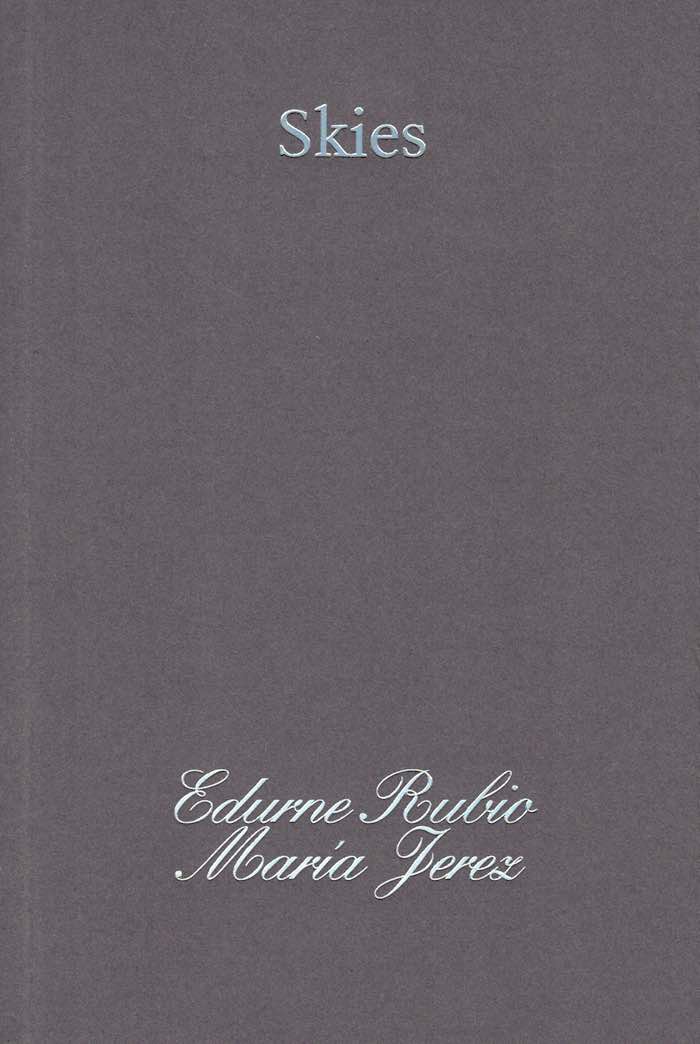
Skies
Skies is a practice that emerged when Edurne Rubio and María Jerez found themselves working in isolation during the creation process of their performance A Nublo in 2020. A dialogue in pictures capturing the skies above Madrid, Brussels and many other places, it is now a book and document of a particular time that invites others to reminisce as they read the clouds and ponder invisible worlds that haunt the aether. It comes with an essay by Augusto Corrieri on theatre and cosmos.
Edurne Rubio is a visual artist. Her work leans towards the documentary and starts out from orality and storytelling.
María Jerez creates work at the intersection of choreo graphy, film and visual art. With her work, she wants to open up spaces of possibility through the encounter with what is foreign to us.
www.edurnerubio.org
www.mariajerez.com
Published by Varamo Press in the essay series Gestures
First edition October 2022
200 pages, 11 x 16.5 cm, sewn perfect binding
ISBN: 978-82-691492-6-5
Graphic design by Michaël Bussaer
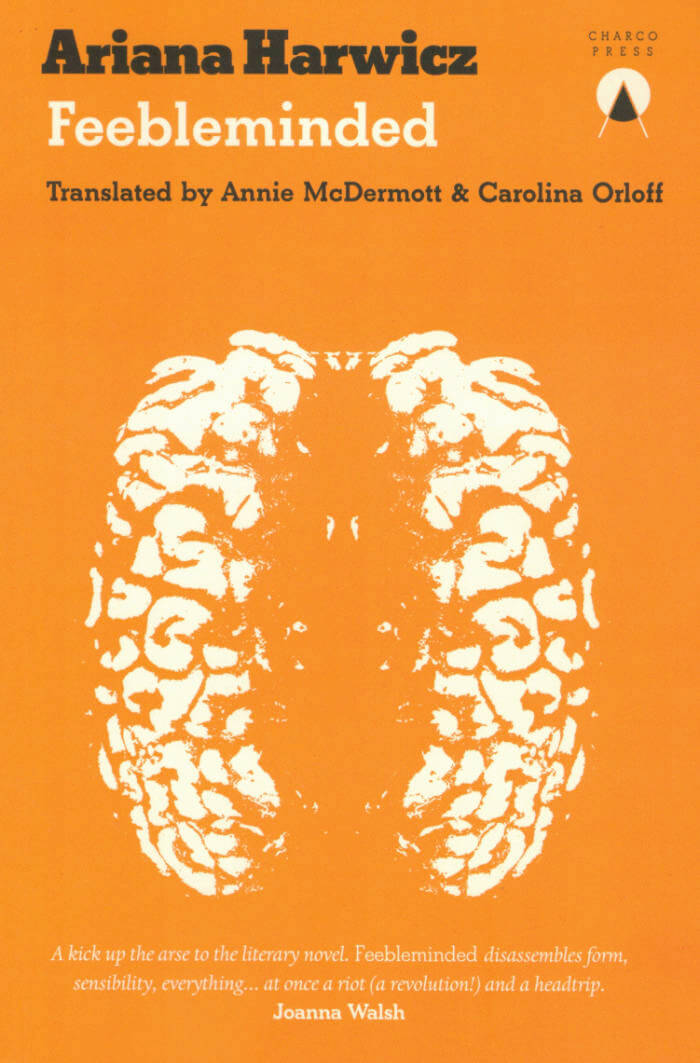
Feebleminded
The unraveling of a mother/daughter relationship that is at once chaotic, loving, and mercilessly destructive.
Following the international success of Die, My Love (longlisted for the Man Booker International Prize 2018), Ariana Harwicz again takes us into the darkest recesses of the imagination with this delirious, furious account of a mother and daughter bound by chaos as much as love. Driven to the edge by the men in their lives, they oscillate between erratic bursts of housework, lazing in the garden, and drunken escapades. But is the constant undercurrent of violence all in the daughter's mind or will they actually go through with their plan for revenge? With a shocking, edge-of-the-seat finale worthy of Thelma & Louise if it were remade by David Lynch, Feebleminded is a wild ride of a novel with echoes of Ágota Kristóf, Elfriede Jelinek and Alan Warner, and will leave you both shaken and begging for more.
Compared to Nathalie Sarraute and Virginia Woolf, Ariana Harwicz is one of the most radical figures in contemporary Argentinian literature. Her prose is characterised by its violence, eroticism, irony and criticism of the clichés surrounding the notions of the family and conventional relationships. Born in Buenos Aires in 1977, Harwicz studied screenwriting and drama in Argentina, and earned a degree in Performing Arts from the University of Paris VII as well as a Master's in comparative literature from the Sorbonne. She has taught screenwriting and written plays, which have been staged in Buenos Aires. Feebleminded (which has also been adapted for the stage in Argentina and Spain) is her second novel and a sequel in an 'involuntary' trilogy, preceded by Die, My Love (Charco Press, 2017) and followed by Precocious. Her fourth novel, Degenerate comes out in June 2019. Die, My Love was longlisted for the Man Booker International Prize (2018) and shortlisted for the Republic of Consciousness Prize (2018). It has been translated into more than ten languages.

Dead Girls
Not a police chronicle, not a thriller, but a contemporary noir novel of the ongoing catastrophe of femicide and the murder of three young women in interior of Argentina.
Femicide is generally defined as the murder of women simply because they are women. In 2018, 139 women died in the UK as a result of male violence (The Guardian). In Argentina this number is far higher, with 278 cases registered for that same year. Following the success of The Wind That Lays Waste, internationally acclaimed Argentinian author Selva Almada dives into the heart of this problem with this journalistic novel, comparable to Truman Capote’s In Cold Blood or John Hersey’s Hiroshima, in response to the urgent need for attention to a serious problem of our times.
Almada narrates the case of three small-town teenage girls murdered in the 1980’s; three unpunished deaths that occurred before the word ‘femicide’ was even coined. In this brutal but necessary novel, Almada brings to the fore these crimes committed in the interior of the country, while Argentina was celebrating the return of democracy. Three deaths without culprits: 19-year old Andrea Danne, stabbed in her own bed; 15-year old María Luisa Quevedo, raped, strangled, and dumped in wasteland; and 20-year old Sarita Mundín, whose disfigured body was found on a river bank. Selva Almada takes these and other tales of abused women to weave together a dry, straightforward portrait of gender violence that surpasses national borders and speaks to readers’ consciousness all over the world.
This is not a police chronicle, although there is an investigation. This is not a thriller, although there is mystery and suspense. The real noir element of Dead Girls lies in the heart of the women described here and of the men that have abused them. With her unique style of prose that captures the invisible, and with lyrical brutality, Almada manages to blaze new trails in this kind of journalistic fiction.
Compared to Carson McCullers, William Faulkner, Flannery O'Connor, Sara Gallardo and Juan Carlos Onetti, Selva Almada (Entre Ríos, Argentina, 1973) is considered one of the most powerful voices of contemporary Argentinian and Latin American literature and one of the most influential feminist intellectuals of the region. Including her debut _The Wind that Lays Waste, _she has published two novels, a book of short stories, a book of journalistic fiction and a kind of film diary (written in the set of Lucrecia Martel's most recent film Zama, based on Antonio di Benedetto's novel). She has been finalist of the Rodolfo Walsh Award and of the Tigre Juan Award (both in Spain). Her work has been translated into French, Italian, Portuguese, German, Dutch, Swedish and Turkish. This is her second book to appear in English after _The Wind that Lays Waste _(Winner of the EIBF First Book Award 2019).

Tender
The third and final installment of Ariana Harwicz's Involuntary Trilogy finds us on familiar, disquieting ground. Under the spell of a mother's madness, the French countryside transforms into a dreamscape of interconnected imagery: animals, desire, the functions of the body. Most troublingly: the comfort of a teenage son. Scorning the bourgeois mores and conventionality of their small town, she withdraws him from school and the two embark on ever more antisocial and dangerous behavior. Harwicz is at her best here, building an interior world so robust, and so grotesque, that it eclipses our shared reality. Savage, and savagely funny, she leaves us singed, if not scorched.
Compared to Nathalie Sarraute and Virginia Woolf, Ariana Harwicz is one of the most radical figures in contemporary Argentinian literature. Her prose is characterised by its violence, eroticism, irony and criticism of the clichés surrounding the notions of the family and conventional relationships. Born in Buenos Aires in 1977, Harwicz studied screenwriting and drama in Argentina, and earned a degree in Performing Arts from the University of Paris VII as well as a Master's in comparative literature from the Sorbonne. She has taught screenwriting and written plays, which have been staged in Buenos Aires. Feebleminded (which has also been adapted for the stage in Argentina and Spain) is her second novel and a sequel in an 'involuntary' trilogy, preceded by Die, My Love (Charco Press, 2017) and followed by Precocious. Her fourth novel, Degenerate comes out in June 2019. Die, My Love was longlisted for the Man Booker International Prize (2018) and shortlisted for the Republic of Consciousness Prize (2018). It has been translated into more than ten languages.
Translated by Carolina Orloff and Annie McDermott.
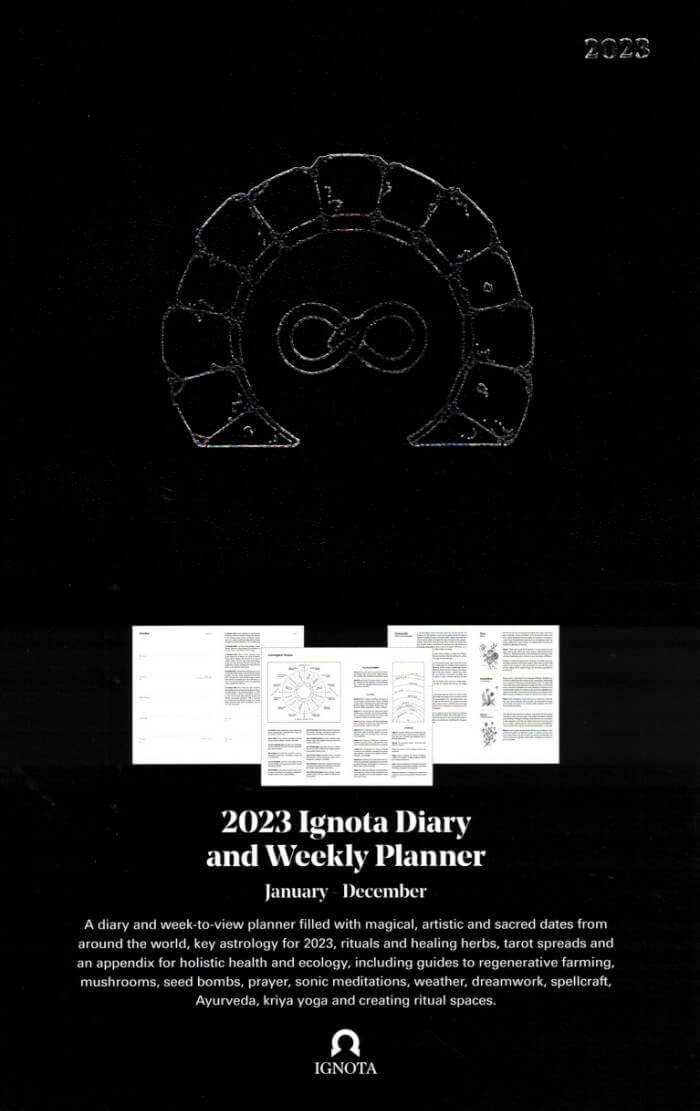
Ignota Diary 2023
This beautifully designed diary and week-to-view planner is filled with historically significant magical and sacred dates from around the world. Drawn from events such as the Buddha’s birthday, esoteric festivals and artistic and occult history, the diary touches on the lives of characters such as Ursula K. Le Guin, Ithell Colquhoun, Zora Neale Hurston, Carl Jung, Simone Weil, Leonora Carrington, Maya Deren, Aleister Crowley, George Bataille, Timothy Leary, Hilma af Klint, Saint Hildegard of Bingen, William Blake, W.B. Yeats and Octavia Butler.
Contributors:
Acupressure by Maria Christofi, Astrology by SJ Anderson, Ayurveda and Prajna by Mira Manek, Dreamwork by Jennifer Dumpert, Herbal Remedies by Paige Emery, Kriya Yoga by Rachel Okimo, Korean Ink Illustrations by Jungran Kim, Mushroom Guide by Ellen Percival, Prayer Guide by K Allado-McDowell, Regenerative Farming by Elias Haase, Rituals by Pam Grossman and Himali Singh Soin, Ritual Spaces by Leila Sadeghee Seed Bombs by Jenna Sutela, Soji by Shoukei Matsumoto, Sonic Meditation by Pauline Oliveros, Spellcraft by Bones Tan-Jones, Tarot by CAConrad and T. Susan Chang, Weather by Jay Drinkall

Worms #5 'Impurity'
In this issue, Worms explores New Narrative alongside writers working today that incorporate some of it’s themes. The cover star Saidiya Hartman talks with Rhea Dillon about the limits and processes of creating stories from the archive, while Camille Roy and Dodie Bellamy give insight into New Narrative from their experiences involved in the movement. Savannah Knoop tells about their life playing the character of J.T Leroy, while Calla Henkel delves into ideas of using other people’s narratives as our own. There’s lots of gleaning, lots of stealing and lots of hard truths coming from the human body. There is poetry and fiction and all of the usual bits, as well as an experimental cut up piece demonstrating the appropriation method that Kathy Acker (via William Burroughs) used in so much of her work. Many more worms to be found in these pages.
Featuring:
Saidiya Hartman, Camille Roy, Dodie Bellamy, Lynne Tillman, Estelle Hoy, Rhea Dillon, Savannah Knoop, Lauren Fournier, Madelyne Beckles, Joanna Walsh, Anne Turyn, Cristina Morales, Calla Henkel, Jenny Zhang
Contributors:
ZARA JOAN MILLER, HAYDEE TOUITOU, NICOLE DELLA COSTA, CECILIA PAVON, VALENTINA VON KLENCKE, FEYI ADEGBITE, ALICE PLATTI, VICTORIA CAMPA, ALICE BUTLER, CLEMMIE BACHE, CAITLIN MCLOUGHLIN, JACK STUART MILLS, HONOR WEATHERALL, ARCADIA MOLINAS, AIMEE BALLINGER, WES KNOWLER, ELEANOR WANG, KATY DADACZ, OLIVE COURI, RACHEL CATTLE, ISABELLE BUCKLOW, SARAH BODRI, HOPE ROAFL, MAURA SAPPILO, JODIE HILL, JACQUELINE ENNIS COLE, MARY WATT, DELIA RAINEY.
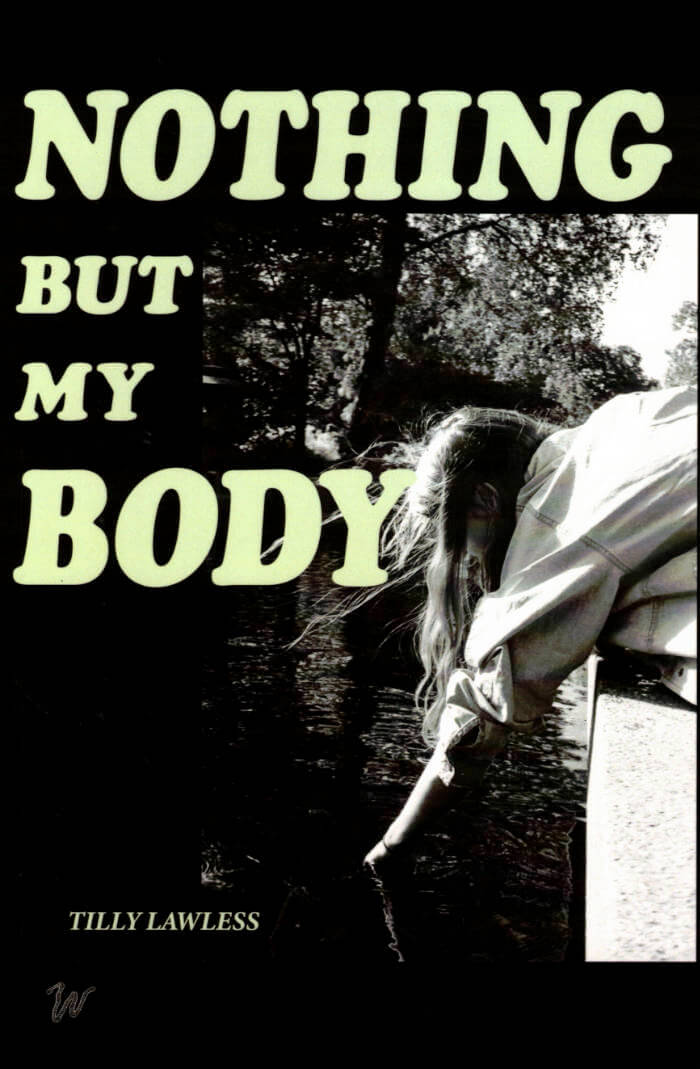
Nothing But My Body
Nothing But My Body is an eight-day journey through the mind of a young woman, a queer sex worker in Australia, as she navigates breakups and infatuation across just over a year.
The unnamed narrator’s voice is both fierce and vulnerable, defiant and tender, as she explores the interplay between her external and internal world, and the fluctuations of her emotions as love affairs intensify and wane. Her loneliness is assuaged by her beloved chosen family-her friends-and by the beauty of the natural world.
Set during the cataclysmic bushfire season of 2019 and into the coronavirus pandemic and lockdown, sex work is the constant backdrop of the story as it moves between Sydney, Berlin, Orange and Bellingen. The beauty of the writing and the moving and deeply engaging sense of compassion that threads through this remarkable novel give true meaning to the concepts of inclusivity and community in surprising and original ways.
This stunning, unflinching and lyrical debut is both a rejection of romantic love, a euphoric celebration of the queer community and a reckoning with the body as both abject and joyous.
...
Worms Publishing works across form and genre to bring experimental writers to the literary topsoil. Working outside of conventional publishing, Worms endeavours to support and cultivate underrepresented voices with a focus on female and non-binary authors and artists.
Nothing But My Body by Tilly Lawless is Worms’ first title. This fictionalised stream of consciousness, takes an unflinching look at sex work, queerness, class and mental health from the perspective of a Sydney-based sex worker over eight days.

Verlag der Buchhandlung Walther König
Cologne art fair 1977
Jack Smith presented his performance Irrational Landlordism of Bagdad as part of the Cologne Art Fair fringe in the summer of 1977. Many other events were documented photographically and can now be found in the Cologne Art Fair archives - not so Smith's performance.
This book shows him in his fair stall and during his performance for the first time. The pictures are perfect documents of a completely eccentric transaction by this pioneering director and performance artist.
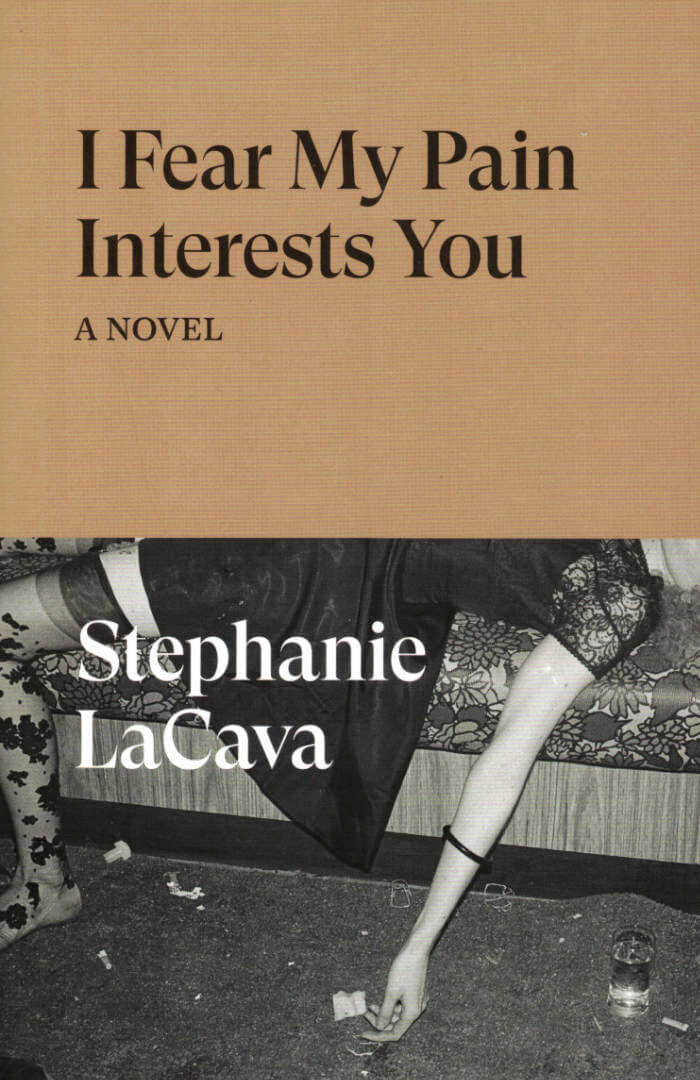
I Fear My Pain Interests You
A punky, raw novel of millenial disaffection, trauma and 1960s cinema.
Margot is the child of renowned musicians and the product of a particularly punky upbringing. Burnt-out from the burden of expectation and the bad end of the worst relationship yet, she leaves New York and heads to to the Pacific Northwest. She's seeking to escape both the eyes of the world and the echoing voice of that last bad man. But a chance encounter with a dubious doctor in a graveyard, and the discovery of a dozen old film reels, opens the door to a study of both the peculiarities of her body and the absurdities of her famous family.
A literary take on cinema du corps, Stephanie LaCava's new novel is an audaciously sexy and moving exploration of culture and connections, bodies and breakdowns.

Pleasure Activism: The Politics of Feeling Good
How do we make social justice the most pleasurable human experience? How can we awaken within ourselves desires that make it impossible to settle for anything less than a fulfilling life? Author and editor adrienne maree brown finds the answer in something she calls "pleasure activism," a politics of healing and happiness that explodes the dour myth that changing the world is just another form of work. Drawing on the black feminist tradition, she challenges us to rethink the ground rules of activism. Her mindset-altering essays are interwoven with conversations and insights from other feminist thinkers, including Audre Lorde, Joan Morgan, Cara Page, Sonya Renee Taylor, and Alexis Pauline Gumbs. Together they cover a wide array of subjects—from sex work to climate change, from race and gender to sex and drugs—building new narratives about how politics can feel good and how what feels good always has a complex politics of its own.
Building on the success of her popular Emergent Strategy, brown launches a new series of the same name with this volume, bringing readers books that explore experimental, expansive, and innovative ways to meet the challenges that face our world today. Books that find the opportunity in every crisis!
adrienne maree brown, author of Emergent Strategy and co-editor of Octavia's Brood, is a social justice facilitator focused on black liberation, a doula/healer, and a pleasure activist. She lives in Detroit.

Everything for Everyone: An Oral History of the New York Commune, 2052-2072
By the middle of the twenty-first century, war, famine, economic collapse, and climate catastrophe had toppled the world's governments. In the 2050s, the insurrections reached the nerve center of global capitalism—New York City. This book, a collection of interviews with the people who made the revolution, was published to mark the twentieth anniversary of the New York Commune, a radically new social order forged in the ashes of capitalist collapse.
Here is the insurrection in the words of the people who made it, a cast as diverse as the city itself. Nurses, sex workers, antifascist militants, and survivors of all stripes recall the collapse of life as they knew it and the emergence of a collective alternative. Their stories, delivered in deeply human fashion, together outline how ordinary people's efforts to survive in the face of crisis contain the seeds of a new world.
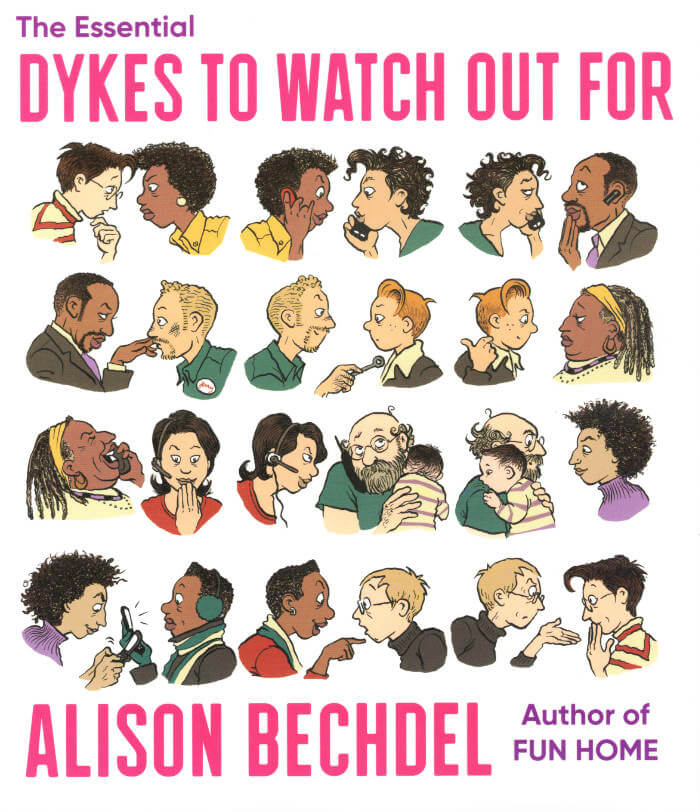
The Essential Dykes to Watch Out for
For twenty-five years Bechdel’s path-breaking Dykes to Watch Out For strip has been collected in award-winning volumes (with a quarter of a million copies in print), syndicated in fifty alternative newspapers, and translated into many languages. Now, at last, The Essential Dykes to Watch Out For gathers a “rich, funny, deep and impossible to put down” (Publishers Weekly) selection from all eleven Dykes volumes. Here too are sixty of the newest strips, never before published in book form.
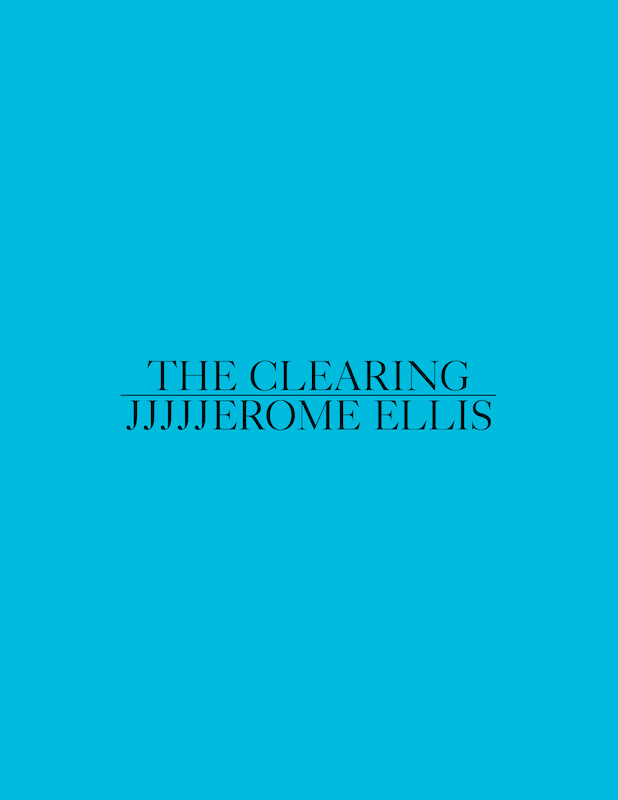
The Clearing
JJJJJerome Ellis’s The Clearing asks how stuttering, blackness, and music can be practices of refusal against hegemonic governance of time, speech, and encounter. Taking his glottal block stutter as a point of departure, Ellis figures the aporia and the block as clearing to consider how dysfluency, opacity, and refusal can open a new space for relation. Stemming from Ellis's essay "The clearing: Music, dysfluency, Blackness, and time,” published in 2020 in the Journal of Interdisciplinary Voice Studies (Volume 5, Issue 2) the present volume transcribes and translates his investigation across genres and media, turning to the page to ask: How can a book bear the trace of music, and the racialized, disabled body? Can a book be not just a manuscript, but a glottoscript? Ellis opens space for thinking liberation theoretically, historically, and lyrically.
"The Clearing is many things: a lyrical celebration of and inquiry into the intersections of blackness, music, and disabled speech; a restless interrogation of linear time; an intimate portrait of the author’s real-time experience of his stutter; a baptism in syllable and sound; and a manuscript illuminated by The Stutter. At its core, Ellis’ metaphor of the clearing becomes a place of possibility and “momentary, transitory, glimpsed liberation.” He invites us to meet him there."—Claudia Rankine